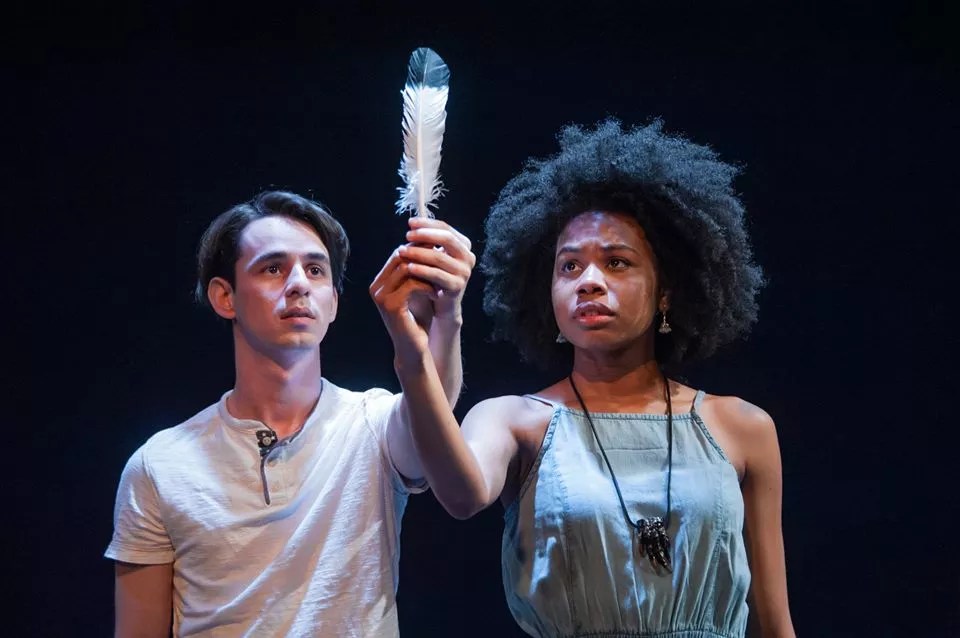

Audio By Carbonatix
On Saturday, Cara Mia Theatre Co. will give a Dallas debut to a play by Pulitzer Prize-winning playwright Quiara Alegría Hudes, who also collaborated with Hamilton playwright and composer Lin-Manuel Miranda on his first musical In the Heights. The play, Yemaya’s Belly, is the story of a Cuban boy’s dream to move to the United States and meet the president.
When artistic director David Lozano chose to produce it, President Obama had just visited Cuba. Lozano says they were intrigued by the experiences of someone living on the island, and felt this was a different story that needed to be told. Then, as a new president took office, the story of an immigrant escaping a poor quality of life became more relevant than ever.
This dreamy play utilizes magical realism to tell the story through the eyes of the naive boy, and Lozano calls it “Brechtian” in tone. Through his encounters the character learns about the culture of the island, but they’re colored by poverty and greed.
“The play doesn’t represent all Cuban experiences, but it reflects a harsh reality of living under the strained economic conditions of the country as well as other countries in the Caribbean,” Lozano says.
The current political climate is not only relevant to the play they’re producing, but it impacts Cara Mia Theatre Co., whose mission is telling the stories of the 11 million immigrants living in this country.
“This president’s reckless immigration policy will have a terrible impact on theater companies around the country,” Lozano says. “Many of our actors over the years have worked with us while processing their papers from visa holders to permanent residents and to citizens.”
Omar Padilla immediately identified with his character, the boy Jesus/Mulo, when he read the script. Padilla is an immigrant who first came to America at the age of 12. He remembers dreaming of tall buildings that he had never seen in his home town of Leon, in the Mexican state of Guanajuato.
Padilla first moved to Brownsville, and that didn’t feel too different from home, he says. But his arrival in Dallas eight years ago surprised him.
“I was really surprised to see the colors of downtown,” he says.
He also came to Dallas to find bigger and better opportunities, to challenge himself, and to find “his hammock.” (He promises that will make sense when you see the show.)
“This country has been really good to me. I know it’s not the same for everyone, but I refuse to be part of the collective fear many people are living right now,” he says. “I think this play and this character came to me in the perfect time. I’m very thankful to Cara Mia.”
For Padilla there is one big disconnect between himself and his character: the desire to meet the president. When Padilla first read the script, he imagined a boy dreaming of meeting President Obama.
“Every time Jesus talked about wanting to meet the president of America, I always pictured an image of love, but now I’m not sure anymore,” he says. “It’s interesting how the character’s naiveté will now play a bigger role because of that image.”
Frida Espinosa Müller, who plays the role of Lila/Mami, is also an immigrant from Mexico. She has grown tired of the idea of the American dream, and says we must move beyond this idea.
“I think we have to evolve and understand that people all around the world deserve a life with dignity,” Müller says. “That means, of course, to have the opportunity to cover the elemental things like, food, housing, clothing, education, health, art.”
Tiana Kaye Johnson plays the role of Yemaya/Maya, and is also the director of education for a new Dallas theater company, Metamorphosis, whose mission is to use theater as a tool to “battle systemic oppression and effectuate social change.” She feels theater practitioners have a responsibility to show audiences how the characters’ interests align with theirs.
“Even if they seem to be mutually exclusive, we must show them the intersectionality of both struggles,” Johnson says. “Otherwise, they see that play as an isolated issue in which they are not implicated or accountable.”
None of the cast or creative team wants to shy away from the play’s political overtones. Director Marisela Barrera refuses to disengage with the world to do theater.
“It’s the opposite: I must create work relevant and connected to my community. I make teatro, stories rooted in U.S. Latinx identity, yet relevant cross-culturally. Because they are American stories. Yemaya’s Belly is an American story. Why? Because it is a story about coming of age, losing your home and taking a big leap of faith.”
Yemaya’s Belly, March 4-19, Latino Cultural Center, 2600 Live Oak St., tickets $10 to $25, caramiatheatre.org.